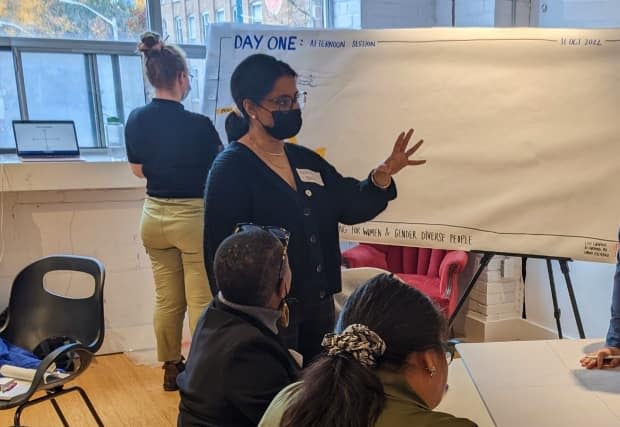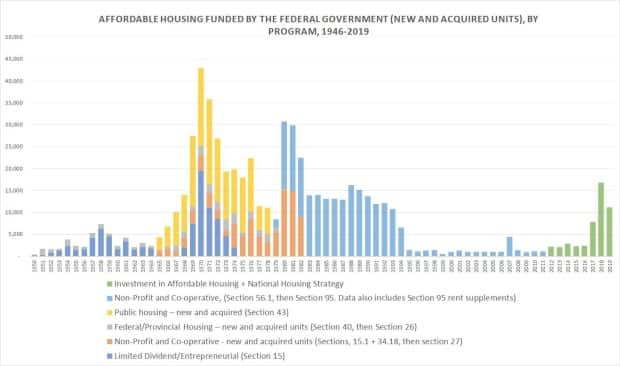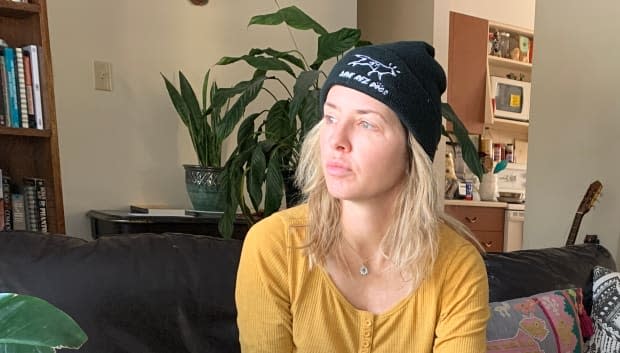Lack of low-cost housing is a human rights violation, say these women collecting evidence in Calgary

With low-income renters in Canada competing for low-cost homes amid a dwindling supply, housing advocates are now asking: If years of lobbying can't bring change, maybe a court challenge will?
They say the lack of low-cost housing is a human rights violation, particularly against women and gender-diverse people.
Such a claim is now sitting in front of the federal housing advocate, a new position within the Canadian Human Rights Commission. Those pushing the issue intend to travel the country collecting evidence this spring, which could also force the issue through the courts, if necessary.
"It's this pulling together of a mass movement of folks who are willing to sign on to legal action and come together and provide evidence," said Khulud Baig, co-author of the human rights claim.
Baig is with the Women's National Housing and Homelessness Network. She splits her time between Calgary and Ottawa, and hopes to host town hall meetings to gather evidence here and in other cities next year. They'll gather personal testimonies to keep documenting the link between a lack of low-cost housing and the stress, violence, hunger and other issues that uncertain or no housing can cause.

Digging into housing solutions
In Calgary this year, rental prices surged 17 per cent and vacancy rates fell. So CBC Calgary has asked community members to text us about their experience in this tight rental market and share thoughts on solutions.
While some called for rent control and more flexible city zoning, others said what's really needed is a shift in perspective. They said society needs to stop seeing housing as just an investment tool, and start looking at it as a basic human right.
So we dug in to better understand what's happening. The human rights claim seems to be a tangible outcome from that push.
Here's how the women's network explains their claim.
A dwindling supply of low-cost rentals
Canada's federal government funded tens of thousands of units of low-income housing a year throughout the '70s and '80s. Then the funding dried up. Very little was built in the 1990s and 2000s and some of what was built earlier is now aging out of the time-limited federal support agreements.

Meanwhile, in the private sector, large corporate landlords have started buying older stock from smaller landlords, renovating it and re-renting at higher rates.
According to the human rights claim, these two factors are critical to the current lack of low-rent units, which forces women to stay in unsafe housing and is also a major cause of homelessness.
In 2015, the Liberal government promised a strategy to address this during the federal election campaign. The National Housing Strategy includes a goal of using 33 per cent of its funds to address the unique needs of women and children.
It also spells out a "right to housing."
Federal funds to market-rate housing
But in practice, says the claim, the strategy has paid the majority of funding to rental developers with few strings attached. Under the Rental Construction Financing Initiative, for example, one-fifth of the units must be offered at an affordable rate, or 30 per cent of a household budget for a household earning the median income for that area.
In Calgary, that would be roughly $2,500 per month.
While construction increases the rental supply overall, this "affordable" rate listed is far out of reach for many who need help.
This contravenes a number of international human rights standards ... (and) may also contravene the Canadian Charter of Rights and Freedoms. - human rights claim
The claim argues: "The effect of these policy decisions is that while low-income women and gender-diverse people are most likely to be in core housing need (particularly if they are lone-parents, racialized, Indigenous or have disabilities), we are least likely to benefit from National Housing Strategy capital investment programs.
"This contravenes a number of international human rights standards … (and) may also contravene the Canadian Charter of Rights and Freedoms."
Legal action depends on public support
The claim was filed in June. Reached this week, staff for housing advocate Marie-Josée Houle said she is still determining what action to take next. But they said the claim already informed the recommendation she issued Nov. 22 to revamp the housing strategy and target those who need housing most.
She also has the option of tabling a report on this in Parliament, which would force Housing Minister Ahmed Hussen to issue some kind of response within 120 days.
Brittany Hendrych, Hussen's press secretary, said the government has built some housing specifically to prevent homelessness. But the statement issued to CBC Calgary did not address the focus on market-rate rental.
"We know that there is much more to be done and will continue to build on our efforts," said Hendrych.
Baig said the network will watch the Liberals' next steps.
They're preparing to take the human rights claim to a court of law instead, if necessary. Evidence and testimonies gathered in the new year will help whether the claim is before the advocate or eventually a judge.
But the court action will go ahead only if enough people show support, she said.
"The legal action piece is in the picture and on the table but it has to come up from the community, by the community."

In Calgary, Courtney Townsend is a single parent who has been struggling to pay her increasing rent.
She now pays $1,800 plus utilities for the small bungalow she's rented for years in southwest Calgary. It's close to her children's school and near enough so she can also support her parents. She works part time for minimum wage and goes to school.
It's not easy, Townsend said.
"It's incredibly expensive to do everything on your own. You're in survival mode, all you're worried about is trying to balance everything. Do I have enough money to pay the rent, to pay the bills, get groceries this month? Do I not pay for car insurance so I can get X, Y and Z, and my kids are OK?"
"You're constantly navigating all these necessities, and your nervous system and your spiritual health is impacted, your mental health is impacted."
She texted CBC Calgary to share her story after waiting years to get a provincial housing subsidy. She finally got one this month. In Alberta, total funding is capped so not everyone who qualifies gets help.
Townsend says the human rights claim — and the idea of housing as a human right — gives her hope.
"People are viewed as commodities here, no matter how you look at it. It's the system."
Rights claim 'a good first step'
Others following the housing issue nationally say the human rights claim is one part of what's needed.
"I do think it's a good first step," said Nemoy Lewis, an assistant professor at the Toronto Metropolitan University, who studies housing policy and its impact on marginalized groups.

Progress in other jurisdictions has often come through a combination of legal challenges and policy changes, he said. Plus, reframing housing issues as a matter of human rights could change the debate around rent caps, tax policy and city zoning rules, too.
Lewis says individual companies may have an obligation to make as much money as they can for their shareholders, but the state should defend human rights and ensure those who can't afford the market-rate homes have options.
"Increased supply (of market rentals) is not going to get us out of this hole that we've dug ourselves. Wages and salaries have not kept pace with housing, and construction costs have risen," he said.
"I definitely think we should have a human rights approach to housing."
Finding Home
CBC Calgary has been asking community members what solutions they see to the current rental crunch.
This human rights approach is one solution they identified. Share your experience and suggestions by adding your cellphone number below.
It's free. Confidential. Unsubscribe any time.


